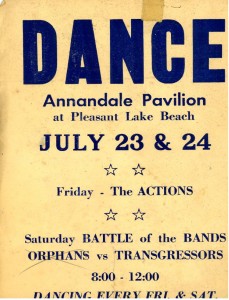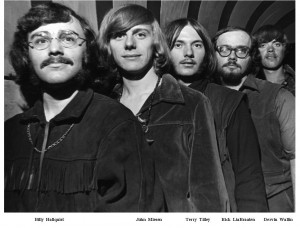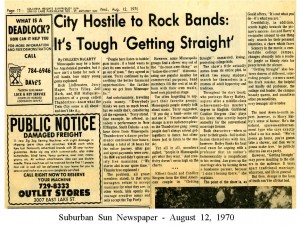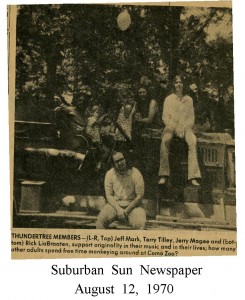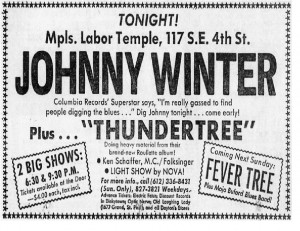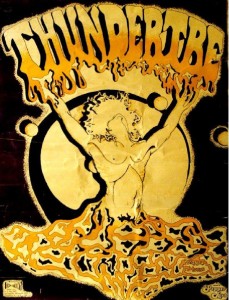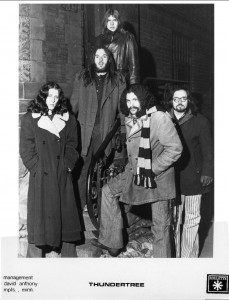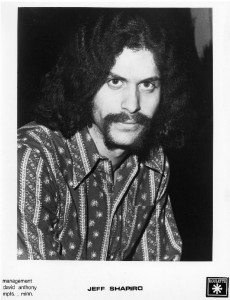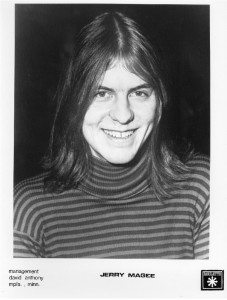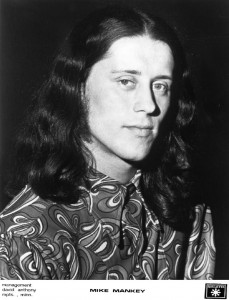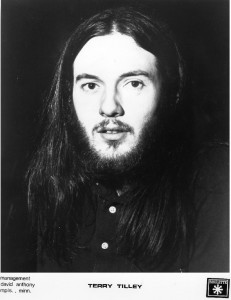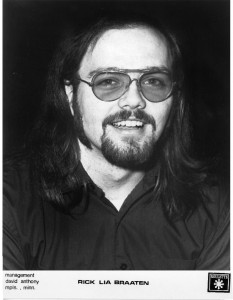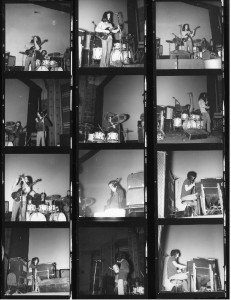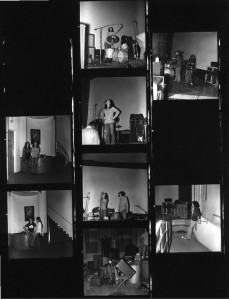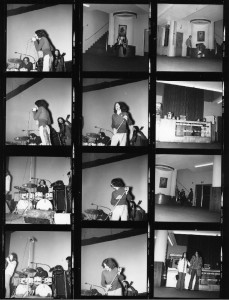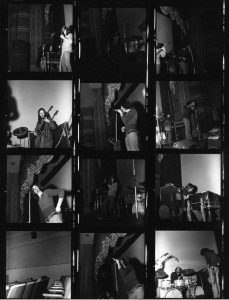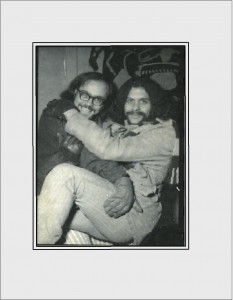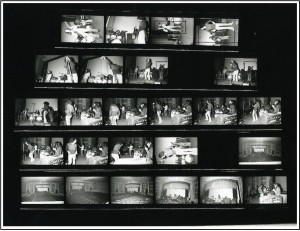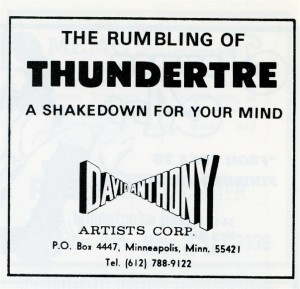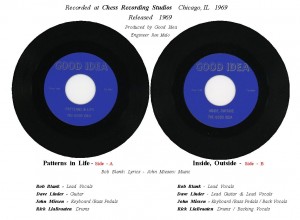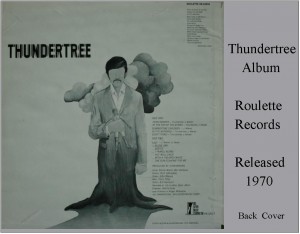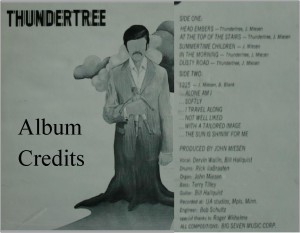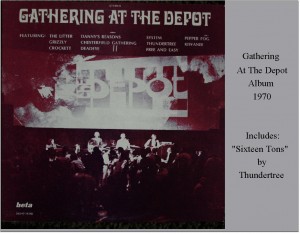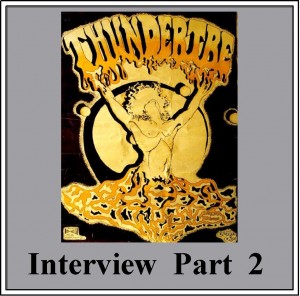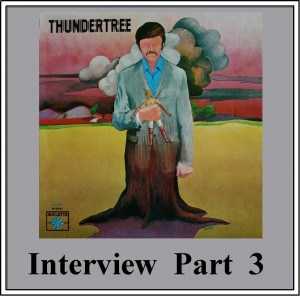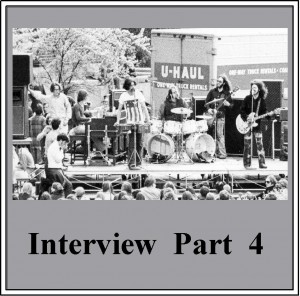Thundertree
Browse [Artist] Details: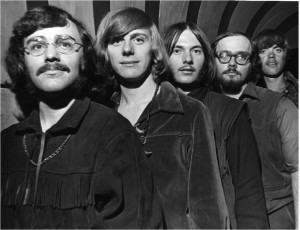
History
Thundertree
(and Good Idea)
Summer, 1967: A new band, Good Idea, comes together, with a focus on playing the Top-40 rock songs and writing original Christian rock songs. The lineup is: Bob Blank on saxophone and lead vocals; Dave Linder on guitar and vocals; John Miesen on keyboards (including bass parts on keys or pedals) and vocals; and Rick Liabraaten on drums and vocals. On the original songs, John writes the music and Bob writes the words. Bob, Dave and John are from the Como Park area of St. Paul and Rick is from Minneapolis. The band plays local teen clubs including Lokates in St. Paul and also plays out state venues in Minnesota and clubs and ballrooms across the border in Wisconsin, including the Midway Ballroom in Independence. The band plays songs by popular bands including The Left Banke, Donovan, The Beatles, The Doors, Cream, and Jimi Hendrix.
Early, 1968: The band goes to Chicago to record a 45 (at their own expense) at the Chess/Checker/Cadet Records studio. The A-side is “Inside, Outside” and the B-side is “Patterns in Life,” originally called “Patterns of Logic.” Both songs are written by John and Bob. 400 copies of the 45 are pressed (Good Idea is also used for the label name). The record gets airplay on a nationally syndicated religious radio program called “Silhouette” that was sponsored through the American Lutheran Church. Reverend John Rygren was the host of the program that aired at 7:00 on Sunday mornings.
John and Bob write a six song mini-rock opera called “1225,” The Christmas story set to modern rock music. The title is a reference to December 25 (Christmas Day).
Summer, 1968: Billy Hallquist starts to run the light show for the band. Billy and Rick are friends going back to junior high school and played together in two bands (The Transgressors and The Other Guys) at Roosevelt High School in Minneapolis.
Fall, 1968: The band records “1225” at Universal Audio, engineered by Bob Shultz. Billy Hallquist is at the recording sessions.
Dave Linder leaves the band to attend college and Billy Hallquist joins on guitar and vocals. After playing one job with Billy in the band (Lakeside Ballroom in Fairmont) the group breaks up.
John Miesen, Rick LiaBraaten and Billy Hallquist continue to practice together and work on new songs, in the basement of Billy’s house in South Minneapolis. They call themselves Final Assembly, but do not play any live shows. The name of the group refers to Billy’s work area at his day job. John writes another mini-rock opera, as a companion piece to “1225” called “Summertime Children.” The group works on musical arrangements for the songs. The group keeps in touch with Bob Blank and plan on starting up a new band to play live again.
Late, 1968: John goes out to New York to shop the tape of “1225” to record companies. Roulette Records takes an interest in the band and signs them to a contract.
John, Rick and Billy ask Bob to rejoin the group. Bob agrees, but on the condition he brings in Terry Tilley on bass guitar. Thundertree becomes the name for the new band. The lineup is: John Miesen on keyboards and vocals; Bob Blank on vocals; Billy Hallquist on guitar and vocals; Terry Tilley on bass guitar and vocals; and Rick LiaBraaten on drums and vocals. The group decides to abandon the mini-rock opera “Summertime Children” and write a number of new songs for the album. “Summertime Children” is revised from a concept to a single song.
Late, 1969: The band schedules time back at Universal Audio to record the second half of their album, now with different members. The band has a job playing at Magoo’s the night before the first session. During the evening, the band’s manager, Jason Kennedy, brings in a record executive with Tetragrammaton Records, who likes Bob, but is not interested in the band. The record executive offers Bob a songwriting deal in Los Angeles and Bob accepts the offer. As the group gathers at the studio the next day to start recording, they discover that Bob has left the band. John asks Billy to take over on lead vocals, but he declines the offer and they hold auditions for a new lead singer. The band begins recording musical tracks during the day and holding auditions for a lead singer in the evening. After a few days of recording musical tracks, Dervin Wallin trys out for lead vocalist and gets the job. John decides to write all new lyrics to the songs that he and Bob co-wrote. After a full week of recording the band completes all the basic music and vocal tracks. Only three or four days after Dervin joins the band the group opens up a show for The Box-Tops at the Sioux Falls Arena in South Dakota. The band returns to the studio for another week of mixing the tracks.
Early, 1970: Roulette Records releases the Thundertree album. Side one of the album contains “Summertime Children” with Billy Hallquist on lead vocals and four original songs with Dervin Wallin on lead vocals. Side two of the album is the mini-rock opera “1225” with Bob Blank on lead vocals. Bob is not credited for vocals on the album and Dave Linder is not credited for guitar and vocals. The music is in the progressive/psychedelic rock genre. The band is interviewed on local radio station KQRS by DJ Allen Stone and are interviewed over a number of weekly shows on a radio station in Rochester. John and Billy promote the album in Winona and Mankato. The album features artwork by New York Artist Ely Besalel that is in the Peter Max style of pop-art. The artwork originates from a band poster that was produced by Pepper Art, a local company with two guys who worked for the local band Pepper Fog.
In addition to the original material on the album, the band plays songs by Led Zeppelin, the Allman Brothers, Quicksilver Messenger Service, Vanilla Fudge, Iron Butterfly and Junior Walker and the All Stars. The band plays a cover version of “Evil Woman” by the local band Crow.
The band plays local clubs including: New City Opera House in Minneapolis; Pudge’s in St. Paul; George’s in St. Louis Park; The Prison in Burnsville and The Prom Ballroom (downstairs) in St. Paul. Out of town, the band plays various dance halls and other venues including The Frog Hop in Cadott, Wisconsin.
One of the band’s cover songs, an obscure folk/country song from the 1940’s, turns out to be a crowd favorite. The song, “Sixteen Tons,” is given a complete modern rock makeover by the band. The origin of the “Sixteen Tons” arrangement started with Terry Tilley playing the bass line, Billy added a harmony part ( parallel 5th) on guitar, Dervin joined in on vocals and an old song was given new life.
The band plays a show with The Amboy Dukes at the Duluth Armory.
The band plays a concert at The Labor Temple with other local bands including The Marauders.
The band purchases a band bus owned by Jokers Wild. The vehicle is an orange school bus with a number of the seats removed to provide space for band equipment and for the band members to sleep.
Thundertree plays a concert with Jokers Wild and Pepper Fog at the Mayo Civic Auditorium in Rochester.
March 22, 1970: The band plays at The Labor Temple, opening a show for Johnny Winter (Edgar Winter also plays at the event).
The band plays a job (alternating sets) with The Clique at New City Opera House.
Thundertree becomes a popular live act in Albert Lea, Austin and Duluth and also in Eau Claire, Wisconsin.
March, 1970: The band begins to go through a major transition in personnel. Dervin leaves the band to join The Litter and Jeff Shapiro joins the band on lead vocals.
April, 1970: The band opens up for Rotary Connection (with Minnie Riperton) at The Depot.
May, 1970: John Miesen leaves the band and Gerry Magee joins the band on the Hammond B-3.
August, 1970: Billy Hallquist leaves the band and Mike Mankey (from the midwest band Triad) joins the band on guitar. The lineup is now: Jeff Shapiro; Terry Tilley; Gerry Magee; Mike Mankey; and Rick Liabraaten. Rick is the lone member of the group from the original lineup of Good Idea.
September 13, 1970: The band is recorded live at The Depot for a promotional album put together by Alpha Productions. The band records a version of “Sixteen Tons.” Vocal overdubs are added in the studio (Sound 80) after the live recording. Jeff Shapiro sings the lead vocals.
Late, 1970: The album, “Gathering at The Depot” is released on the Beta label and features local bands that are booked through Alpha Productions. The band’s cover version of “Sixteen Tons” is included on the album. The song was first recorded in 1946 by Merle Travis (who also wrote the song) and was a number one hit in the United States in 1955 with a version by Tennessee Ernie Ford. The song is a story about the hard life of a coal miner. The album mistakenly credits Merle Tillis as the writer of the song.
Mid-1971: Thundertree comes to an end.
UPDATE:
In the 1970’s Billy Hallquist recorded two solo albums. The first, “Persephone,” was recorded at Sound 80 in 1971, engineered by Scott Rivard and released in 1972 on Billy’s Orion label. 2,000 albums were pressed up and Billy sold the record at independent record stores and also to overseas buyers including many in Japan. The album featured unique artwork on the front cover, an ink hand drawing of demonic looking creatures by local artist William Stille. The songs are in the psychedelic/folk style. The second album was called “Travelin’” and was recorded at ASI, engineered by David Rivkin and mixed at Sound 80 in quad sound by Paul Martinson. The album was released in 1976 on the local Mill City label, run by Al Heigl. The music on this album is in the country/folk style
June, 2011: Billy Hallquist reports that the Thundertree album was released in 2005 on a CD by a UK company without approval from the band or the record company (Roulette Records was sold to a partnership of EMI and Rhino Records in 1989 and was later acquired by The WEA Group (Warner/Elektra/Atlantic). The UK company has since been shut down for unauthorized releases of albums by various other artists. The Thundertree CD can still be found for sale on the internet. There has been no authorized release of the Thundertree album to date. Billy also reports that his first solo album was released in 2010 on a CD by a record company in Seoul, South Korea. Billy also reports that after leaving Thundertree, he and Dervin went into Micside studio to record a version of “Sixteen Tons,” and an original song written by Billy, “Pepper Palace” (a song inspired by the Pepper Fog band house located at 2541 Grand Avenue South). Dervin sings lead vocals on both songs. The bass player and drummer from local band Grizzly played on both songs. Billy shopped the tape to various record companies in New York but did not land a contract. The songs were never pressed up vinyl.
June, 2011: Rick LiaBratten reports that Reverend Rygren (who played the Good Idea 45 on his radio show) wrote the liner notes on the back of the Thundertree album as “Brother John.” Rick also reports that Reverend Rygren used his connections in New York (where he worked in radio for WABC) to get John Miesen in to meet the executives at Roulette Records resulting in the Thundertree album.
August 17, 2013: Thundertree played their first reunion concert at the “Minnesota Legends Concert” (part of the Made in Minnesota Festival in St. Louis Park). Original members who played at the event were: Billy Hallquist (vocals and guitar); Jeff Shapiro (vocals); Derwin Wallin (vocals); and Rick LiaBraaten (drums). Terry Tilley was at the event but did not play due to a hand injury. Joining the original members on stage were: Denny Libby (keyboard); Jonathon Thomas (bass guitar); and Mark Lamoine (guitar). The band played material from their 1970 Roulette album and Billy Hallquist’s tribute song to the Pepper Fog band house in Minneapolis (“Pepper Palace”). The band finished their set with the band’s signature song “16 Tons” which is included on the compilation album “Gathering at the Depot” from 1970. The band received a warm reception from the local music fans who were at the event.
June 15, 2015: Thundertree played at the Minnesota Legends concert held at Maple Grove Town Green. Playing in the band were: Dervin Wallin on lead vocals; Mike Mankey on guitar and vocals; Jim Steinworth on keyboards and vocals; Gary Lopac on bass guitar and vocals; and Rick LiaBraaten on drums and vocals. Also playing on the bill were Lonnie Knight and Reid Papke, Jokers Wild, and The Litter.
Written by Tom Campbell
Version 1: June 13, 2011
Version 2: June 19, 2011
Copyright by Thomas R. Campbell, 2011
Photos ( Click on Photo’s for Full screen – arrow to next )
Recordings
Patterns in Life – Original 45 – Side A
Inside, Outside – Original 45 – Side B
I Travel Along – Vocal Bob Blank
Summertime Children – Vocal Billy Hallquist
In The Morning – Vocal Dervin Wallin
Sixteen Tons – Vocal Jeff Shapiro
Bandtree
_________________________________________________________
Billy Hallquist Guitar and vocals 1968 – 1970
The Transgressors
The Other Guys
Good Idea
THUNDERTREE
Solo Artist
Macavity
The K.O. Band
Cimmaron
Solo Artist
Perfectly Loud
Blood on the Tracks Live
Three Amigo’s
LA Rod and Reel Club
__________________________________________________________________
Rick LiaBraaten Drums / Vocals 1968 to 1971
The Transgressor’s
The Other Guys
Good Idea
THUNDERTREE
The Hombres
Showcase
Pecos
Sunrise
Denny and the Tornado’s
The Artisan
Main Street
________________________________________________________________
John Miesen Keybords / Vocals 1968 to 1969
Good Idea
THUNDERTREE
________________________________________________________________
Dave Linder Guitar / Vocals 1968 to 1969
Good Idea
THUNDERTREE
________________________________________________________________
Bob Blank Saxophone / Lead Vocals 1968 to 1969
Good Idea
THUNDERTREE
________________________________________________________________
Terry Tilley Bass Guitar / Vocals 1970 to 1971
Looking Glass
THUNDERTREE
Whole Earth Rainbow Band
________________________________________________________________
Jeff Shapiro Lead Vocals 1970 to 1971
THUNDERTREE
________________________________________________________
Dervin Wallin Lead Vocals 1969 to 1970
Tradewinds
THUNDERTREE
The Litter
Grizzly
_______________________________________________________________
Mike Mankey Lead Guitar / Vocals 1970 to 1971
Oliver
Triad
THUNDERTREE
________________________________________________________
Jerry MaGee Keyboards / Vocals 1969 to 1971
_____________
______________
THUNDERTREE
Cain
________________________________________________________________
Where are they now?
Rick LiaBraaten: Living in Minnesota, plays reunion concerts.
Billy Hallquist: Passed away at age 65 on October 12, 2015.
Bob Blank: Deceased.
Dave Linder: Living in Minnesota, no longer active in music.
John Miesen: Living in Australia, no longer active in music.
Dervin Wallin: Living in Arizona, plays reunion concerts.
Terry Tilley: Living in Minnesota, no longer active in music.
Jeff Shapiro: Living in Nebraska, plays reunion concerts.
Mike Mankey: Living in Minnesota, plays solo and reunion concerts.
Jerry MaGee: Living in Minnesota, no longer active in music.
_______________________________________________________________
Interview
Interview PART ONE – Time = 25:10
Interview PART TWO – Time = 26:34
Interview PART THREE – Time = 25:20
Interview PART FOUR – Time = 20:28

